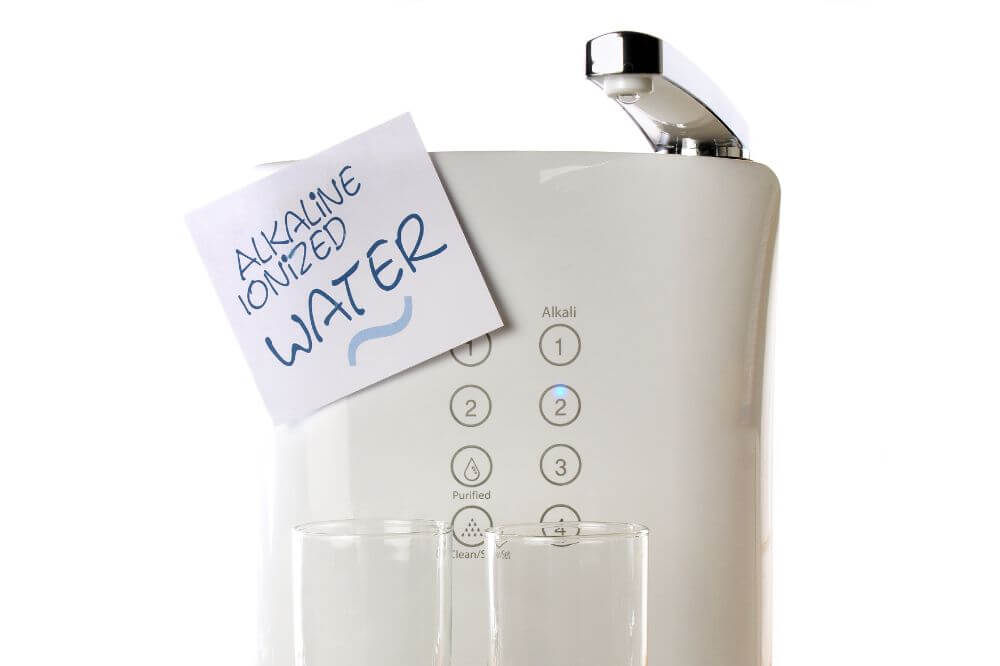If you are looking into water treatment options for your home, particularly for drinking water, the two methods you might be looking at include water ionization and reverse osmosis. Both are water treatment methods, but they are not the same.
Let’s figure out what a water ionizer vs. reverse osmosis water treatment systems are, what they do, how they work, and how they differ from each other.
What is a Water Ionizer?
A water ionizer is a water treatment system that uses a process known as electrolysis to increase the pH level of drinking water. This system takes water and splits it into alkaline and acidic parts. Alkaline water has been shown to have many health benefits for the human body.
The point of a water ionizer is to make your drinking water more alkaline (less acidic). The process works by using an electric current to separate hydrogen and oxygen.
Water that is siphoned near the cathode contains higher hydroxide levels, which increases the pH level, usually to a minimum of 8.0. Many water ionizers allow you to choose the pH level that you want your water.
Ionized vs. Hard Water
Many people wonder about the relationship between water ionization and hard water. Hard water is defined as very alkaline water, specifically high in calcium and magnesium, which can cause hard water buildups, spots, and clogs.
Ionized water is technically hard water. If you wonder whether you will run into hard water issues if you ionize your water, the answer is yes. Ionized water is hard water and may create these issues related to hard water. By no means is ionized water soft water.
Do Water Ionizers Filter Water?
The short answer here is no. Water ionizers do a great job at adding beneficial minerals to your drinking water, but they do not filter water. Some models may have a sediment filter, but that’s about it.
Most basic water ionizers will not remove impurities, chemicals, and other substances from the water. Therefore, if you are concerned about health and safety, you first want to filter the water using sediment filtration and carbon filtering before sending the water through an ionizer.
What is a Reverse Osmosis System?
Reverse osmosis is a type of water purification that uses a very thin, semi-permeable membrane to filter out bacteria, salts, and various impurities. Water pressure is used to force water through the reverse osmosis membrane or filter; the clean water comes out of your tap, and the dirty is disposed of.
When it comes to heavy metals, lead, fluoride, chlorine, chloramine, and about a thousand other substances you don’t want in your drinking water, you want a reverse osmosis system.
While water ionizers do a great job at adding beneficial minerals to the water, they do not filter water like a reverse osmosis system. That said, reverse osmosis does have adverse effects in terms of alkalinity.

Reverse Osmosis and Hard Water
What is essential to know is that while ionizers add minerals to the water, a reverse osmosis system does the exact opposite. Reverse osmosis water is so pure that it barely contains any minerals, which is not good for your health.
For this reason, many reverse osmosis water treatment systems also include water ionizers or so-called re-mineralization processes to put the beneficial minerals back into the water (those that were removed via reverse osmosis).
In terms of the water’s mineral content, reverse osmosis is not ideal, but it is an excellent water filtration and purification method.
Water Ionizers vs. Reverse Osmosis – The Main Differences
Let’s do a quick summary or overview of the main differences between water ionizers and reverse osmosis systems just so you know what you are getting into.
- Water ionizers are designed to raise the pH of the water to make it more alkaline. However, water ionizers do not filter water
- Reverse osmosis systems are designed to filter and purify water from virtually all impurities. However, reverse osmosis systems do not make water more alkaline
- In terms of minerals, water ionizers and reverse osmosis systems do the opposite, with RO actively removing minerals from the water
- Ionized water is much healthier to consume due to those beneficial minerals, but that said, ionized water that has not been filtered may not be healthy due to high levels of contaminants
Conclusion
The bottom line is that for the best results and the cleanest, healthiest, and tastiest water, you probably want to get a reverse osmosis water treatment system as well as a water ionizer. It’s best to get a combination all-in-one system that can do it all.

